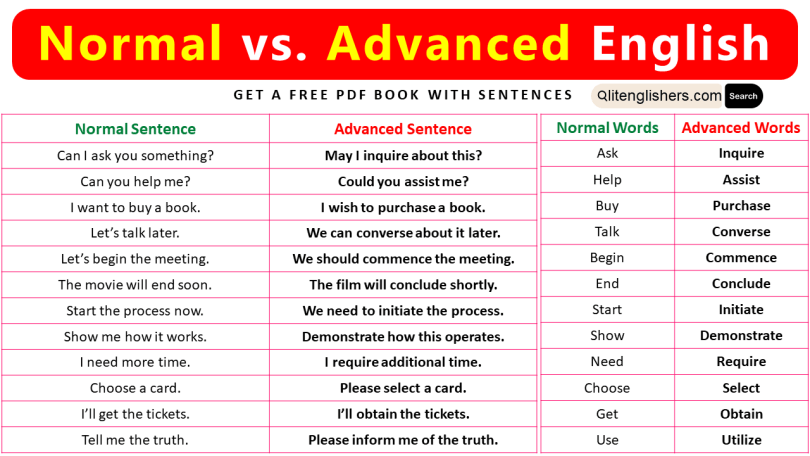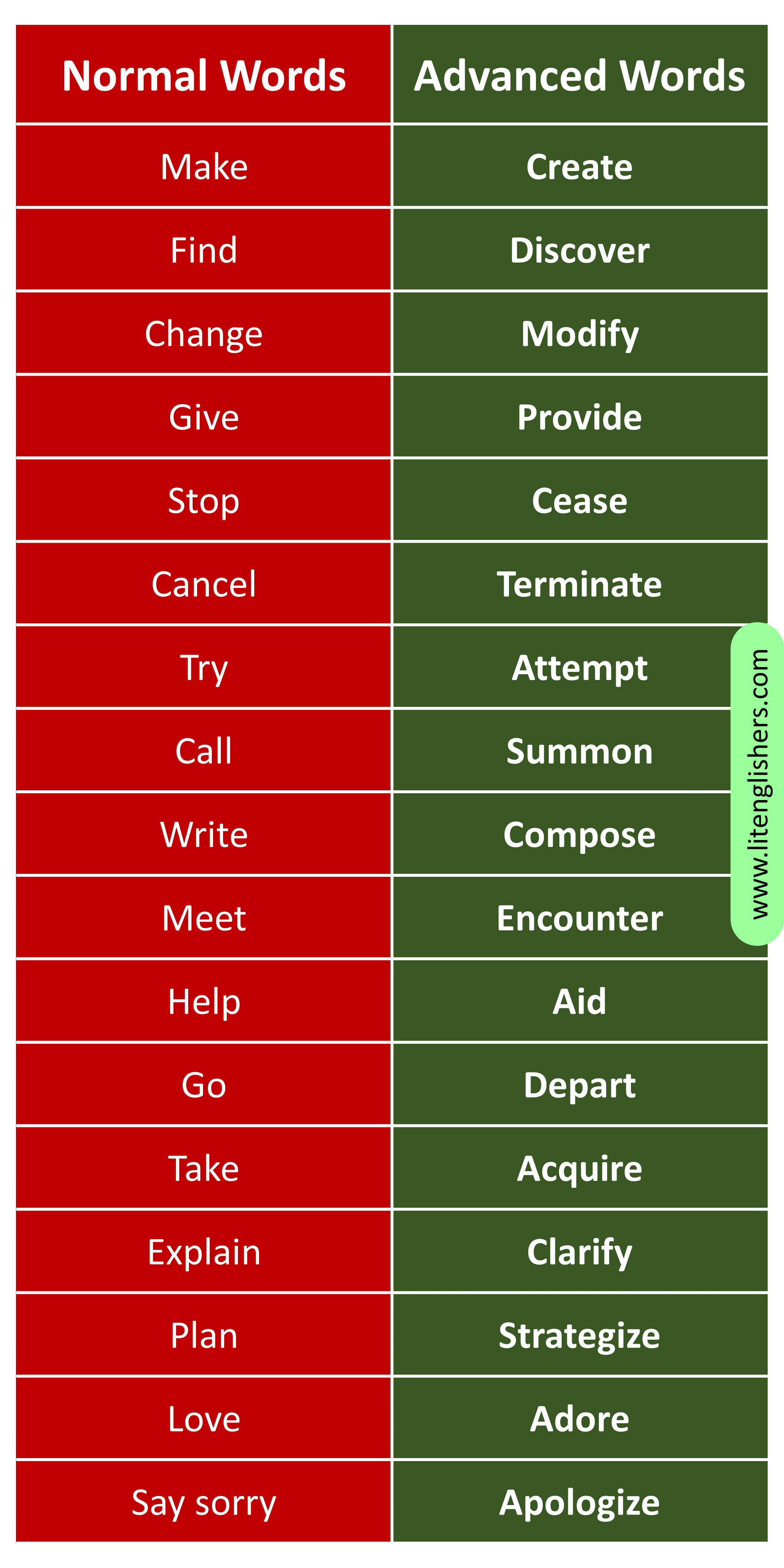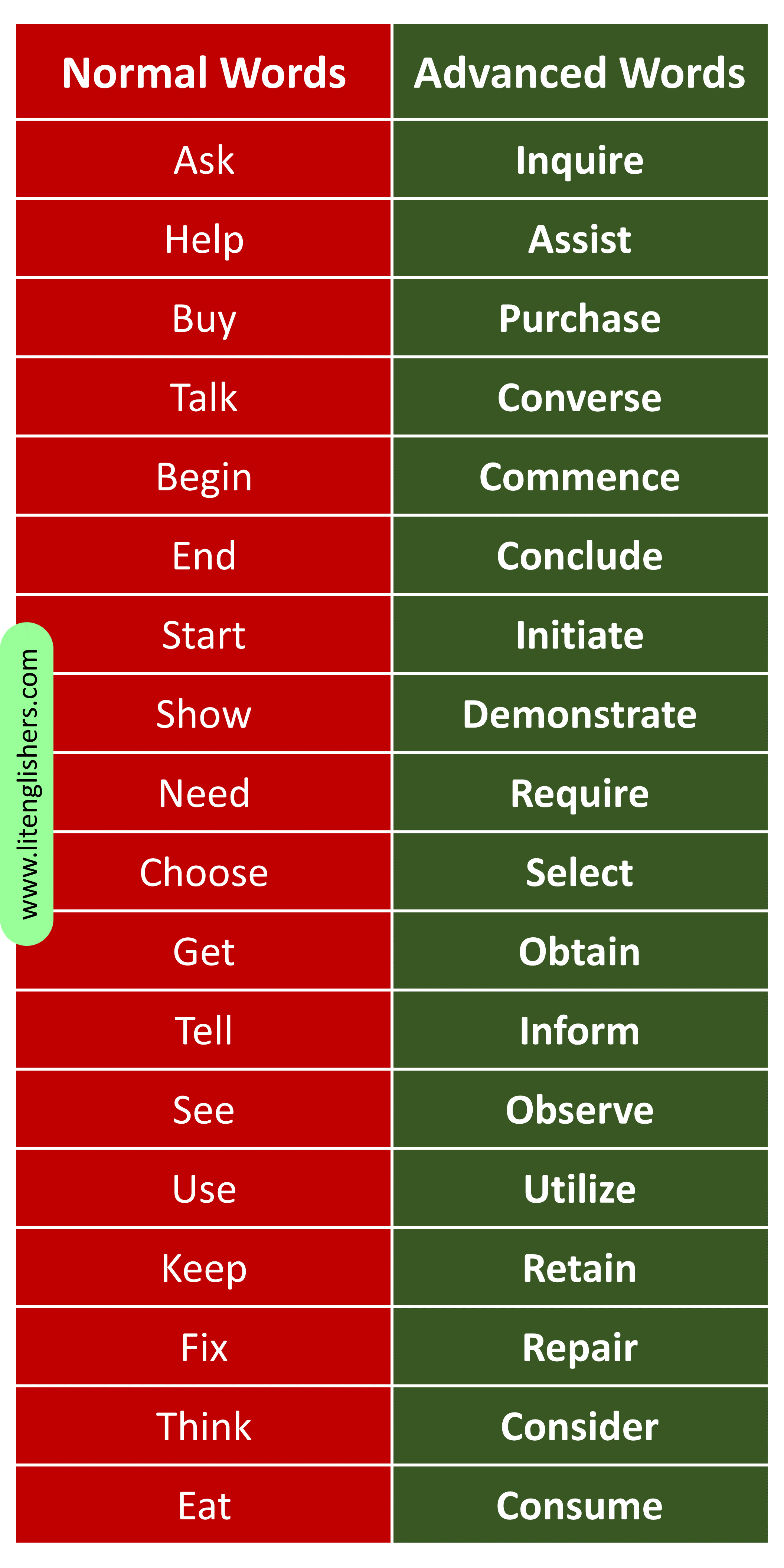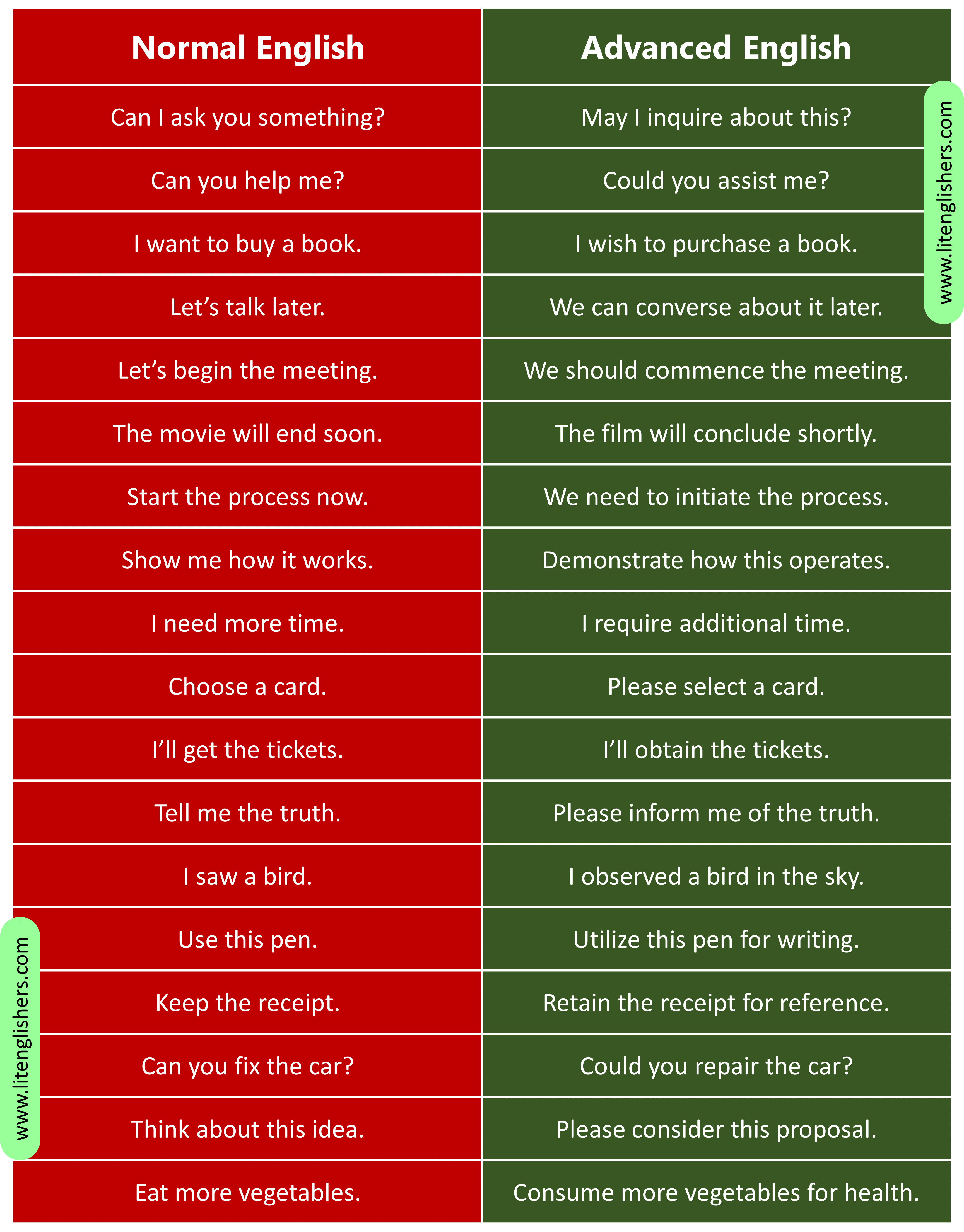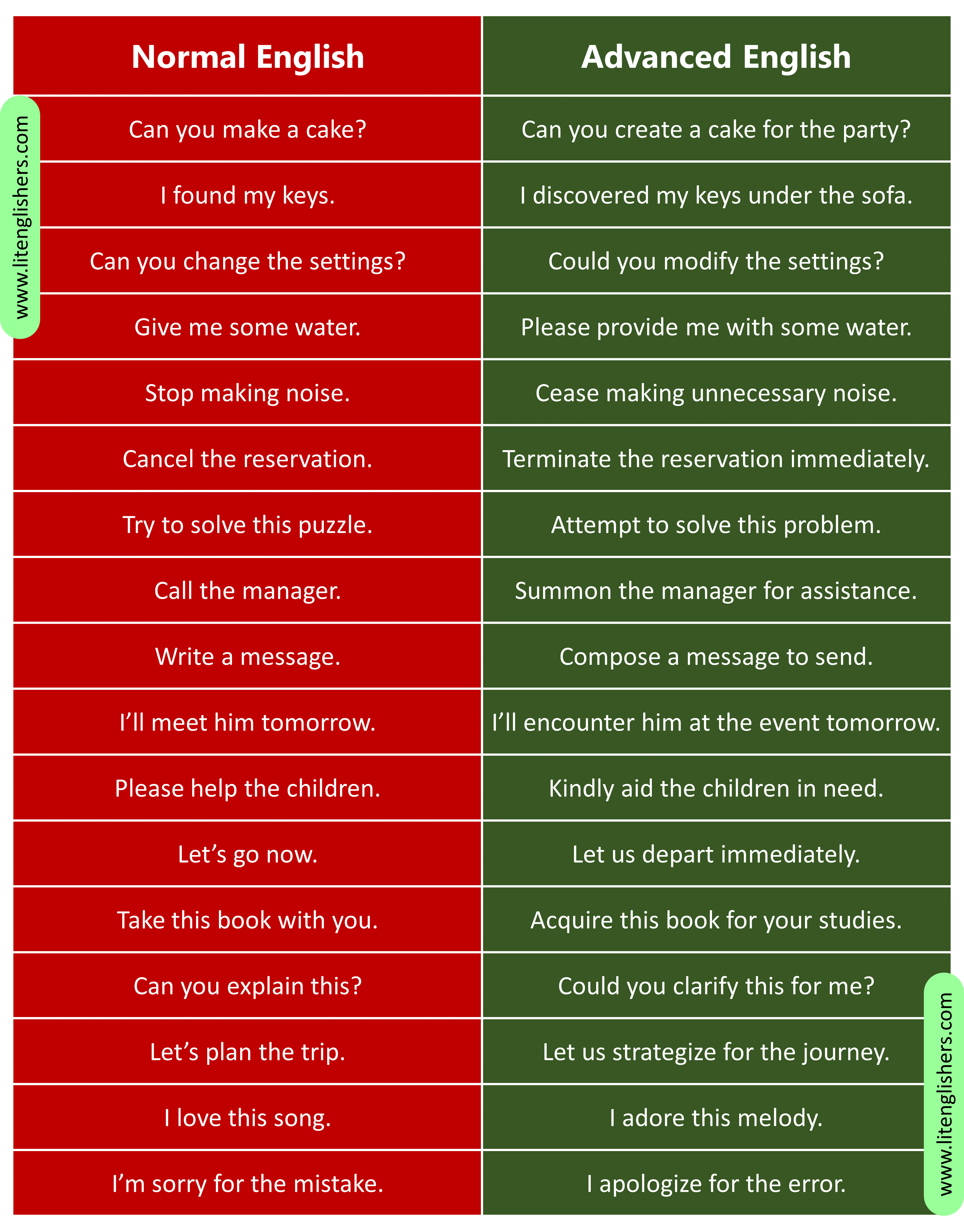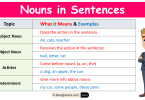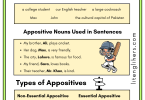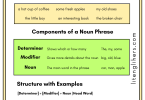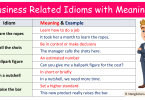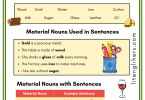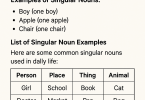Learning the advanced English words along with their example sentences is the easiest way to improve conversation and speaking skills in English. In this lesson, we are going to share with you the 35 commonly used normal vs. advanced English words with examples. After learning these words and examples, you will be able to speak English like a native speaker. So, let’s learn these Normal vs. Advanced English words:
Normal vs. Advanced English Words
Here is a list of Normal vs. Advanced English words:
| Normal English | Advanced English |
|---|---|
| Ask | Inquire |
| Help | Assist |
| Buy | Purchase |
| Talk | Converse |
| Begin | Commence |
| End | Conclude |
| Start | Initiate |
| Show | Demonstrate |
| Need | Require |
| Choose | Select |
| Get | Obtain |
| Tell | Inform |
| See | Observe |
| Use | Utilize |
| Keep | Retain |
| Fix | Repair |
| Think | Consider |
| Eat | Consume |
| Make | Create |
| Find | Discover |
| Change | Modify |
| Give | Provide |
| Stop | Cease |
| Cancel | Terminate |
| Try | Attempt |
| Call | Summon |
| Write | Compose |
| Meet | Encounter |
| Help | Aid |
| Go | Depart |
| Take | Acquire |
| Explain | Clarify |
| Plan | Strategize |
| Love | Adore |
| Say sorry | Apologize |
Learning normal and advanced English words, along with their usage in sentences, enriches your vocabulary and equips you to express yourself confidently in any situation. These words are practical tools for everyday conversation, helping you communicate effectively, whether you’re at work, socializing, or studying. By integrating these words into your daily interactions, you take a step closer to fluency and mastery of the English language.
Basic vs. Advanced Sentences
In this section, we will learn the basic vs. advanced sentences that we can use in our everyday conversation. We can use these sentences when we communicate with our friends, colleagues, or strangers. Normal vs. Advanced sentences are going to enhance your English speaking skills. All are given below; let’s learn these sentences…
1. Ask / Inquire
- Normal: Can I ask you something?
- Advanced: May I inquire about this?
2. Help / Assist
- Normal: Can you help me?
- Advanced: Could you assist me?
3. Buy / Purchase
- Normal: I want to buy a book.
- Advanced: I wish to purchase a book.
4. Talk / Converse
- Normal: Let’s talk later.
- Advanced: We can converse about it later.
5. Begin / Commence
- Normal: Let’s begin the meeting.
- Advanced: We should commence the meeting.
6. End / Conclude
- Normal: The movie will end soon.
- Advanced: The film will conclude shortly.
7. Start / Initiate
- Normal: Start the process now.
- Advanced: We need to initiate the process.
8. Show / Demonstrate
- Normal: Show me how it works.
- Advanced: Demonstrate how this operates.
9. Need / Require
- Normal: I need more time.
- Advanced: I require additional time.
10. Choose / Select
- Normal: Choose a card.
- Advanced: Please select a card.
11. Get / Obtain
- Normal: I’ll get the tickets.
- Advanced: I’ll obtain the tickets.
12. Tell / Inform
- Normal: Tell me the truth.
- Advanced: Please inform me of the truth.
13. See / Observe
- Normal: I saw a bird.
- Advanced: I observed a bird in the sky.
14. Use / Utilize
- Normal: Use this pen.
- Advanced: Utilize this pen for writing.
15. Keep / Retain
- Normal: Keep the receipt.
- Advanced: Retain the receipt for reference.
16. Fix / Repair
- Normal: Can you fix the car?
- Advanced: Could you repair the car?
17. Think / Consider
- Normal: Think about this idea.
- Advanced: Please consider this proposal.
18. Eat / Consume
- Normal: Eat more vegetables.
- Advanced: Consume more vegetables for health.
19. Make / Create
- Normal: Can you make a cake?
- Advanced: Can you create a cake for the party?
20. Find / Discover
- Normal: I found my keys.
- Advanced: I discovered my keys under the sofa.
21. Change / Modify
- Normal: Can you change the settings?
- Advanced: Could you modify the settings?
22. Give / Provide
- Normal: Give me some water.
- Advanced: Please provide me with some water.
23. Stop / Cease
- Normal: Stop making noise.
- Advanced: Cease making unnecessary noise.
24. Cancel / Terminate
- Normal: Cancel the reservation.
- Advanced: Terminate the reservation immediately.
25. Try / Attempt
- Normal: Try to solve this puzzle.
- Advanced: Attempt to solve this problem.
26. Call / Summon
- Normal: Call the manager.
- Advanced: Summon the manager for assistance.
27. Write / Compose
- Normal: Write a message.
- Advanced: Compose a message to send.
28. Meet / Encounter
- Normal: I’ll meet him tomorrow.
- Advanced: I’ll encounter him at the event tomorrow.
29. Help / Aid
- Normal: Please help the children.
- Advanced: Kindly aid the children in need.
30. Go / Depart
- Normal: Let’s go now.
- Advanced: Let us depart immediately.
31. Take / Acquire
- Normal: Take this book with you.
- Advanced: Acquire this book for your studies.
32. Explain / Clarify
- Normal: Can you explain this?
- Advanced: Could you clarify this for me?
33. Plan / Strategize
- Normal: Let’s plan the trip.
- Advanced: Let us strategize for the journey.
34. Love / Adore
- Normal: I love this song.
- Advanced: I adore this melody.
35. Say Sorry / Apologize
- Normal: I’m sorry for the mistake.
- Advanced: I apologize for the error.
Advanced words allow you to express your thoughts more clearly and formally. In workplaces, academic settings, or official correspondence, advanced vocabulary often leaves a better impression. Certain words are better suited to specific situations. Understanding advanced vocabulary helps in comprehending formal speeches, business documents, or academic material that often use these words. Using advanced words correctly in conversations makes you feel more confident in your language skills, whether in casual talks or formal discussions.
Learning both normal and advanced words lets you tailor your language depending on whether the conversation is formal or informal. Advanced words can add clarity and accuracy to your statements. Being able to switch between normal and advanced words increases your flexibility in conversations, helping you interact with different audiences, whether friends, colleagues, or clients. Advanced words can make your speech or writing more engaging and impactful, making you stand out.
The PDF book of this lesson is given below. Just click on the below link and download it for free:
Normal vs. Advanced English Words.PDF
Normal vs. Advanced Sentences.PDF
This lesson is categorized into two parts. We provide the PDF books of both parts. The first part of the PDF book is about words, and the second one is about normal vs. advanced sentences.
You May Also Like
- 100 Normal vs. Advanced English Words
- Formal and Informal Words list in English
- Dawn Vocabulary Words in English with PDF
- Commonly Confusing Words in English
